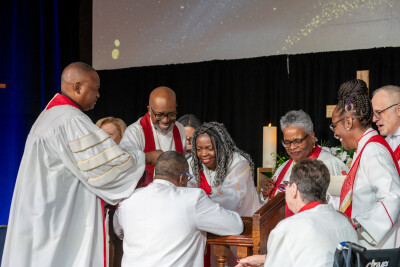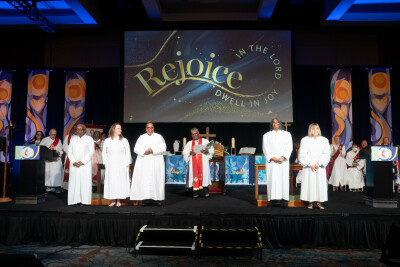Ordinands and commissioners urged to ‘live in joy’

By Erik Alsgaard
It is always a day of rejoicing when new clergy are ordained, commissioned, or licensed at Annual Conference. That joy overflowed the Hilton Hotel ballroom in Baltimore as Bishop LaTrelle Easterling and Bishop Cynthia Moore-Koikoi presided over a colorful and inspired service of worship on May 15.
Bishop Easterling is the resident bishop of the Baltimore-Washington and Peninsula-Delaware Episcopal Area. Bishop Moore-Koikoi is resident bishop of the Eastern Pennsylvania and Greater New Jersey Episcopal Area, and a daughter of the Baltimore-Washington Conference.
Surrounded by clergy members of the conference wearing white robes and red stoles, family members, loved ones, and church members, nine candidates were ordained to the Order of Elder, two were ordained to the Order of Deacon, three were commissioned as Elders, and two were commissioned as Deacon.
 A special holy moment during the ordination service occurred when Bishop Moore-Koikoi ordained her husband as an Elder, the Rev. Raphel Kimba Koikoi.
A special holy moment during the ordination service occurred when Bishop Moore-Koikoi ordained her husband as an Elder, the Rev. Raphel Kimba Koikoi.
The service flowed from an opening time of remembering baptism to the introduction and examination of candidates, the reading of Scripture, the singing of spirit-filled anthems, and the sharing of the Word.
Bishop Moore-Koikoi, who also served as the Bible study leader for the Annual Conference Session, preached on both Philippians 4:4-9 and John 15:1-11.
“I can hear those who are mothers and fathers and parents of you in the ministry,” the bishop said. “I can hear them singing in this moment. Can you hear them singing ‘glory, halleluiah. Worthy is the lamb?’”
They’re singing, rejoicing for you, she said. “Take their rejoicing wherever you go in ministry.”
Bishop Moore-Koikoi reminded those about to be ordained and commissioned that Bishop Easterling had asked them a series of questions the day before. The “historic examination,” she said, dates back to 1773 and the start of the Methodist movement.
“Actually,” she said, “you’re being drafted into a movement that started with Jesus. We just happen to be one of those branches off of the vine called the Methodist tradition.
“You are not out there alone,” the bishop continued. “But rather, you are connected to the vine that will nourish you in your call. You are connected to the vine that has been connected since Peter. That’s what God calls you to.”
And then Bishop Moore-Koikoi said she had one more question to ask.
“It is a critical one,” she said, “because it might help this branch called United Methodism return to its roots as a movement. The question is based on the theme of this Annual Conference. Here’s my question: after you get ordained or commissioned, where are you going to live? When all this inspired worship and celebration is over, where are you going to live?”
 The bishop wasn’t asking for a physical address. Instead, she encouraged those hearing her preach to live, to dwell, in the neighborhood of joy.
The bishop wasn’t asking for a physical address. Instead, she encouraged those hearing her preach to live, to dwell, in the neighborhood of joy.
“When the grant money runs out, where are you going to live? When the appointment or ministry setting can no longer afford you, where are you going to live? When ICE shows up at the door of your sanctuary, where are you going to live? When the next executive order comes out, where are you going to live,” she asked.
“When I ask you, ‘where are you going to live?’ here’s the answer: ‘Bishop, we’re going to live in joy.’ That’s where we need you to be in this United Methodist movement.”
Noting that there are many other neighborhoods people can live in – such as hatred, misery, complacency, and more – she pleaded, “Beloved, each and every day you’re going to need to make a decision of where you want to live.”
We need you to live in joy, she said, because if you’re living in those other neighborhoods, “the church becomes impotent or irrelevant, and the church does not bring about joy and justice and peace. If you’re living in those other neighborhoods, the children will not know about Jesus Christ. And if you’re living in those other neighborhoods, you will be lying to the world about who Jesus is.”
Beloved, Bishop Moore-Koikoi said, “Guard your hearts and your minds so that you will always live in joy.”
 During the traditional altar call at the end of the service, the Rev. TC Morrow, an ordained Deacon, came forward with the Rev. Ginger Gaines-Cirelli, of Foundry UMC in Washington, D.C., supporting her, stating that she was being called to the ministry of an Elder. Both women were in tears.
During the traditional altar call at the end of the service, the Rev. TC Morrow, an ordained Deacon, came forward with the Rev. Ginger Gaines-Cirelli, of Foundry UMC in Washington, D.C., supporting her, stating that she was being called to the ministry of an Elder. Both women were in tears.
Morrow said the church had put limitations on her in the past. She had shared her status as a gay woman before she was ordained.
“Thank God,” Bishop Easterling said, “that those limitations have been removed and she is coming forward to be ordained as an Elder. And she wants to be understood that this takes nothing away from the order of Deacons. She is being called to become an Elder.”
And the conference closed as it began, with joy.
Those ordained to the Order of Deacon: Marjorie Hurder Buhrman; Kristin Weschier
Those ordained to the Order of Elders: Dawn Brooks-Tharps; Jonathan Rickard Brown; YouJung Jung; Raphel Kimba Koikoi; Daein Park; Tommy Murray; Dionne Hall; Daniel C. Wood, Jr.; Anna Kathleen Schwartz
Those commissioned as Deacon: Shaw Brewer; Sharee Wharton
Those commissioned as Elder: Bisi Adebesin; Emily Louise Farnell; Shelley R. Hawkins
